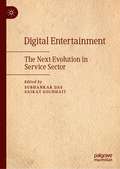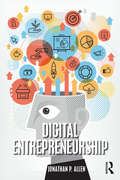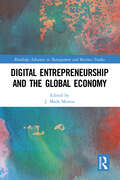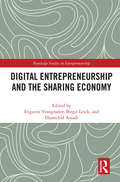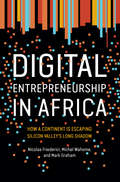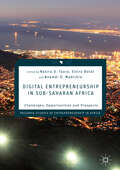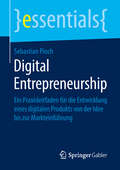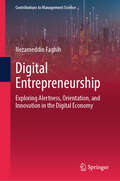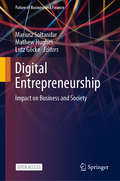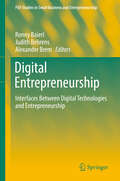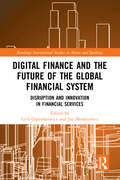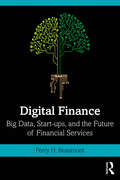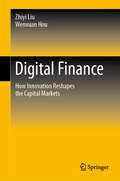- Table View
- List View
Digital Entertainment: The Next Evolution in Service Sector
by Subhankar Das Saikat GochhaitThis book presents a clear constructive representation for policy framework, effect, and integrities of various platforms that are vocal about digital entertainment. It provides a holistic representation of all the platforms, whether they are application based or AI based or web portal based.Digital Entertainment incorporates Internet-based gaming, remote gaming, online applications for TV, music, and films fans, and types of consumer-to-consumer (C2C) stimulation that includes human–PC or human–human or human–mobile collaboration through the Internet (or remote).
Digital Entrepreneurship
by Jonathan P. AllenTechnology has enabled a new age of entrepreneurship as entrepreneurs find digital tools that enable new ventures to exploit commercial opportunities around the world. This textbook provides students with expert guidance on using technology platforms to start new ventures. <P><P> With an award-winning approach, the author guides readers through the process of a lean startup, taking a "digital first" approach to entrepreneurship. Students using the book will emerge with enhanced understanding of different digital business models, analytical skills for digital ventures, and the confidence to move from prototype to product. <P><P> Online resources such as slides, a sample syllabus, and exercises encourage the classroom to become an interactive and dynamic space.
Digital Entrepreneurship and the Global Economy (Routledge Advances in Management and Business Studies)
by J. Mark MunozDigital entrepreneurship refers to business activities in the digital media and information and information and communication technologies. It encompasses entrepreneurial pursuits in areas such as artificial intelligence, blockchain, internet of things, and augmented reality among many more. The digital economy is expected to bring about $60 Trillion in revenue by 2025. With the rise and proliferation of emerging technologies globally, entrepreneurs have pursued opportunities to leverage skills, abilities, and resources to find innovative revenue streams. Companies such as Facebook, Uber, and Twitter are examples of highly successful digital firms that have become giants in the industry. Entrepreneurs and executives from all over the world are looking to follow in their footsteps. The book will outline and discuss ideas and approaches for companies of all sizes to benefit from the digital economy. This edited book brings together chapter contributions from leading practice experts and academics from all over the world. It advances contemporary thinking on digital entrepreneurship and aims to become the ultimate reference guide on the subject, making it especially valuable to researchers, academics, students, and professionals in the fields of entrepreneurship, international business, and the management of technology and innovation.
Digital Entrepreneurship and the Sharing Economy (Routledge Studies in Entrepreneurship)
by Evgueni VinogradovThe digital and increasingly digitised world is shaped by the interplay of new technological opportunities and ubiquitous societal trends. Both lead to drastic changes facing artificial intelligence (AI), cryptocurrencies and block-chain technologies, internet of things, technology-based surveillance, and other disruptive innovations. These developments facilitate the rise of the sharing economy and open for a variety of new entrepreneurial opportunities that businesses can take up. The novel entrepreneurial opportunities, however, imply a paradigmatic shift in the understanding of entrepreneurship. This book combines digital entrepreneurship with the sharing economy. It presents cutting-edge research for scholars and practitioners interested in either one of the topics – digital entrepreneurship or sharing economy – or their connection. The book addresses three major ways to become entrepreneurial in the sharing economy: digital entrepreneurship through creating novel sharing-economy platforms; technology entrepreneurship through the exploitation of sharing-economy platforms; and business model innovation or business model change influenced by the sharing economy. The book also highlights governance questions on digital entrepreneurship in the sharing economy, which are highly relevant for businesses, the economy, and society. The book will be of interested to researchers, academics, and students in the field of business and entrepreneurship, with a special focus on digital entrepreneurship.
Digital Entrepreneurship in Africa: How a Continent Is Escaping Silicon Valley’s Long Shadow
by Mark Graham Nicolas Friederici Michel WahomeThe hope and hype about African digital entrepreneurship, contrasted with the reality on the ground in local ecosystems.In recent years, Africa has seen a digital entrepreneurship boom, with hundreds of millions of dollars poured into tech cities, entrepreneurship trainings, coworking spaces, innovation prizes, and investment funds. Politicians and technologists have offered Silicon Valley-influenced narratives of boundless opportunity and exponential growth, in which internet-enabled entrepreneurship allows Africa to "leapfrog" developmental stages to take a leading role in the digital revolution. This book contrasts these aspirations with empirical research about what is actually happening on the ground. The authors find that although the digital revolution has empowered local entrepreneurs, it does not untether local economies from the continent's structural legacies.
Digital Entrepreneurship in Sub-Saharan Africa: Challenges, Opportunities and Prospects (Palgrave Studies of Entrepreneurship in Africa)
by Nasiru D. Taura Elvira Bolat Nnamdi O. MadichieThis pioneering collection seeks to understand why and how some digital enterprises in Africa progress while others firms either stagnate or regress. Using a range of detailed case studies, it addresses the challenges and barriers that are in place and how some outstanding digital firms deal with operating in a hostile business environment. While digital platforms have created equal access for small businesses, many digital entrepreneurs in Africa continue to struggle with local environments replete with corruption, and other economic inefficiencies. The contributions move the debate forward by addressing the challenges, opportunities, and prospects of digital enterprise in Africa. Placing special emphasis on how African new entrant digital firms are shaping the landscape and forging a new beginning for Africa, this book offers entrepreneurial perspectives to both researchers and policy-makers seeking to support and stimulate entrepreneurship in the new era.
Digital Entrepreneurship: Ein Praxisleitfaden für die Entwicklung eines digitalen Produkts von der Idee bis zur Markteinführung (essentials)
by Sebastian PiochSebastian Pioch beschreibt in diesem essential an einem durchgehenden Beispiel, wie Start-ups oder bestehende Unternehmen digitale Produkte entwickeln, testen und schließlich am Markt etablieren können. Kompakt und leicht verständlich führt der Autor aus, welche Schritte und Methoden geeignet sind, um mit limitierten Ressourcen und Erfahrungswerten ein digitales Produkt erfolgreich zu entwickeln. Digital Entrepreneurship beschreibt jene Bereiche der Betriebswirtschaftslehre, die speziell Unternehmungen zuzuordnen sind, die ohne physische Ressourcen wertschöpfen. Im Gegensatz zum klassischen Unternehmertum gelten hier einige Besonderheiten, die gerade in der aktuellen Diskussion zur Digitalen Transformation breite Anwendung finden.
Digital Entrepreneurship: Exploring Alertness, Orientation, and Innovation in the Digital Economy (Contributions to Management Science)
by Nezameddin FaghihFocusing on emerging features of digital transformation, digital economy, digital innovation, and digital entrepreneurship, this edited volume highlights new aspects of digital transformation and research progress in the field. Chapters cover a wide range of topics such as: promoting the growth of the digital economy through the alertness of entrepreneurs; predicting entrepreneurial performance through the lens of entrepreneurial orientation and digital adoption with a machine learning approach; proposing a guide to emphasize the key aspects of social media analytics; examining the digital pathology ecosystem and key drivers for investment in more efficient disease diagnosis and monitoring; exploring how humane orientation contributes to the intention to use digital entrepreneurship with a gender perspective. Concluding with a review of the extant digital economy literature, the volume proposes a future research agenda which will be useful not only for researchers and academics, but also for entrepreneurs and policymakers.
Digital Entrepreneurship: Impact on Business and Society (Future of Business and Finance)
by Lutz Göcke Mathew Hughes Mariusz SoltanifarThis open access book explores the global challenges and experiences related to digital entrepreneurial activities, using carefully selected examples from leading companies and economies that shape world business today and tomorrow. Digital entrepreneurship and the companies steering it have an enormous global impact; they promise to transform the business world and change the way we communicate with each other. These companies use digitalization and artificial intelligence to enhance the quality of decisions and augment their business and customer operations. This book demonstrates how cloud services are continuing to evolve; how cryptocurrencies are traded in the banking industry; how platforms are created to commercialize business, and how, taken together, these developments provide new opportunities in the digitalized era. Further, it discusses a wide range of digital factors changing the way businesses operate, including artificial intelligence, chatbots, voice search, augmented and virtual reality, as well as cyber threats and data privacy management. “Digitalization mirrors the Industrial Revolution’s impact. This book provides a complement of perspectives on the opportunities emanating from such a deep seated change in our economy. It is a comprehensive collection of thought leadership mapped into a very useful framework. Scholars, digital entrepreneurs and practitioners will benefit from this timely work.”Gina O’Connor, Professor of Innovation Management at Babson College, USA“This book defines and delineates the requirements for companies to enable their businesses to succeed in a post-COVID19 world. This book deftly examines how to accomplish and achieve digital entrepreneurship by leveraging cloud computing, AI, IoT and other critical technologies. This is truly a unique “must-read” book because it goes beyond theory and provides practical examples.”Charlie Isaacs, CTO of Customer Connection at Salesforce.com, USA "This book provides digital entrepreneurs useful guidance identifying, validating and building their venture. The international authors developed new perspectives on digital entrepreneurship that can support to create impact ventures.” Felix Staeritz, CEO FoundersLane, Member of the World Economic Forum Digital Leaders Board and bestselling author of FightBack, Germany
Digital Entrepreneurship: Interfaces Between Digital Technologies and Entrepreneurship (FGF Studies in Small Business and Entrepreneurship)
by Alexander Brem Ronny Baierl Judith BehrensDigital technologies have become a new economic and social force, reshaping traditional business models, strategies, structures, and processes. Digital entrepreneurship, which focuses on creating new ventures and transforming existing businesses by developing novel digital technologies or their novel usage, is seen as a critical pillar for economic growth, job creation, and innovation by many countries. Further, digital technologies have also enabled the growth of the sharing economy, linking owners and users and disrupting the previous dualism of businesses and customers.This volume discusses the management of new technology-based firms and technology projects initiated in academic or industrial contexts. The contributions feature new theoretical concepts, ethical considerations, empirical data analysis (qualitative and quantitative), archival and historical methods, design science approaches, action and field research, as well as management science methods, informatics and cybernetics.
Digital Entrepreneurship: Management, Systems and Practice
by Vincenzo MorabitoA comprehensive guide to digital entrepreneurship, bridging academic research and industry practice. Morabito provides a strategic overview of the main challenges and trends related to digital entrepreneurship, structured in three parts. Part I focuses on strategy and management issues, guiding readers through the theory and practice of building, implementing and growing new digital ventures and outlining the skills that are necessary for digital entrepreneurs to succeed and lead. Part II focuses on digital business systems, describing the main technological aspects that support and comprise the core infrastructure for digital entrepreneurship, including social media and the Internet of Things. Finally, Part III provides analyses of three core industries in which digital ventures are particularly important: fintech, manufacturing and fashion. Digital Entrepreneurship will appeal to students and researchers in the areas of digital strategy/innovation and information systems management. It will also be of interest to practitioners looking to develop or innovate digital ventures.
Digital Equipment Corp.: The Endpoint Model (A)
by David A. Garvin Janet SimpsonDescribes a comprehensive manufacturing strategy designed to reduce substantially the cycle time of orders (i.e. the time between the placement of an order by a customer and its delivery to the customer). To launch the strategy Digital has adopted manufacturing resource planning (MRP II). The case allows students to assess the pros and cons of the strategy which requires rapid information flows and tight manufacturing discipline, the usefulness of MRP II which integrates manufacturing with overall business plans, and the implementation process to date.
Digital Equipment Corp.: The Kodak Outsourcing Agreement (A)
by Herminia Ibarra Lynda M. Applegate Keri OstrofskyDescribes grassroots effort which culminated in Digital's winning a competitive bid for the outsourcing of Kodak's internal telecommunications business. Describes the "Telstar" project, from the initial identification of the business opportunity to the process of crafting a partnership contract. Discussion topics include obtaining managerial and peer support, mobilizing informal networks, building an ad hoc team, managing relationships across organizational boundaries, and planning the transition from project team to ongoing operations. As the case ends, a key player must be replaced and a decision must be made concerning which Digital group will manage the new business. Russ Gullotti, the Digital executive who has overseen this effort considers how to help the team achieve a successful contract negotiation and subsequent transition to operations. Should also prompt discussion about leadership under ambiguity and management of innovation.
Digital Era and Fuzzy Applications in Management and Economy (Lecture Notes in Networks and Systems #384)
by Janusz Kacprzyk Antonio Terceño-Gómez José M. Merigó Martha del Pilar Rodríguez García Klender Aimer Cortez Alejandro Maria Teresa Sorrosal ForradellasThis book aims to contribute to the discussion about the implications of fuzzy logic, neural networks, digital era, and other intelligent techniques on organizations. This book will be very useful for academic researchers and postgraduate students aiming to introduce themselves to the field of quantitative techniques for overcoming uncertain environments and developing models to make decisions. Developments in other theories and socioeconomic and computational changes have shed light on the importance of fuzzy applications in social sciences. The treatment of uncertainty in the economic and business analysis is fundamental and requires instruments compatible with the uncertain environment of economics and business, because most of the traditional models have been overtaken by this reality when trying to make decisions with uncertain information. In the face of information technology, digitization, and uncertainty, organizations confront new opportunities and challenges. In order to take advantage of these opportunities and overcome current and future challenges, it is needed to understand the evolution of these phenomenon.
Digital Etiquette For Dummies
by Eric Butow Kendra Losee Kelly Noble MirabellaMind your online P's and Q's with this expert digital manners guide Conducting yourself online can be challenging. It sometimes seems like the web and social media is tailor-made to cause upset and anger. But, with the right guide, anyone can learn how to be a beacon of civility and politeness online. In Digital Etiquette For Dummies, a team of online communication experts share their combined insights into improving your presence on social media, writing emails that exude positivity and clarity, behaving correctly in virtual meetings, and much more. You'll become a paragon of politeness as you learn to apply the timeless rules of etiquette to the unique environment of the web, social media, email, Zoom, and smartphones. In this book, you'll also: Learn near-universal etiquette rules for email, social media, cellphones, and more Discover ways to make sure that your polite attitude isn't being lost in the text-only context of a business email Avoid common social media pitfalls and digital faux pas that can trip up even the most careful communicators A great handbook for anyone who uses digital communication in business or in their personal life (so, pretty much everyone), Digital Etiquette For Dummies also belongs on the reading lists of those trying to improve their online interactions on social media.
Digital Everywhere, Inc.
by Paul A. GompersPresents a valuation problem in a fictitious firm, Digital Everywhere. Students have the opportunity to compare various discounted cash flow valuation models in an entrepreneurial firm.
Digital Exposure: Postmodern Postcapitalism
by Raphael SassowerThis book adopts an explicitly postmodernist perspective of the digital revolution. While exploring issues relating to the re-creation of social life in the digital world, its main focus is on the political economy and in particular the extent to which the paradigms of capitalism and socialism can be mapped as postcapitalism onto this new world.
Digital Express First-Year Course: An Accounting Simulation Using Special Journals and Covering a Closely Held Merchandising Corporation (4th edition)
by Glencoe/McGraw-HillA student guide that simulates the accounting for a merchandising corporation.
Digital Factory: A Digital Compass for Smart Manufacturing (Synthesis Lectures on Mechanical Engineering)
by Luka KozamernikThe Digital Factory is a comprehensive guide for leaders in the manufacturing sector looking to navigate the complex digital transformation landscape. Digitalization has become crucial to any company's success in today's fast-paced business world. However, making sense of the plethora of information on approaching digitalization can be challenging, leaving many leaders needing clarification. The pressure to make the right decisions can be overwhelming, with various groups advocating their interests. Without a clear vision and understanding of digital transformation, leaders may lack confidence in making the right company decisions. And with access to specific and valuable knowledge about digital transformation, achieving optimal returns for the company can be more accessible. This book is designed to empower leaders in the manufacturing sector to overcome these challenges.
Digital Fashion Innovations: Advances in Design, Simulation, and Industry (Textile Institute Professional Publications)
by Abu Sadat Muhammad SayemDigitalisation is becoming a standard practice in the fashion industry. Innovation in digital fashion is not just limited to computer-aided design (CAD) and manufacturing (CAM), rather it runs throughout the fashion supply chain, from product life cycle management and developing new business models that promote sustainability to connecting virtual and augmenting reality (VR/AR) with fashion for enhanced consumers experience through smart solutions. Digital Fashion Innovations: Advances in Design, Simulation, and Industry captures the state-of-art developments taking place in this multi-disciplinary field: Discusses digital fashion design and e-prototyping, including 2D/3D CAD, digital pattern cutting, virtual drape simulation and fit analysis. Covers digital human modelling and VR/AR technology. Details digital fashion business and promotion, including application of e-tools for supply chain, e-commerce, block chain technologies, big data, and artificial intelligence (AI). This interdisciplinary book will appeal to professionals working in textile and fashion technology, those developing AR and AI for clothing end uses, and anyone interested in the business of digital fashion and textile design. It will also be of interest to scientists and engineers working in anthropometry for a variety of disciplines, such as medical devices and ergonomics.
Digital Finance Law: Common and Civil Law (Routledge Research in International Commercial Law)
by Robert WaltersThis book assesses the rapidly changing landscape of digital finance regulation. Focusing on the laws of banking-finance, tax, insurance, intellectual property (patents and copyright) and international commercial arbitration, it also delves into the regulation of tokens and the laws pertaining to its development, use, and transaction.The book undertakes a comparative study of civil and common law jurisdictions such as Australia, India, Japan, Singapore, United Kingdom, European Union, and the United States. It explores how each jurisdiction is at various stages of developing its digital economy and providing banking and financial regulations for crypto-digital assets such as tokens. It also highlights the potential for global regulatory change and collaboration, such that there is a robust, efficient, and harmonised framework of standards, codes and law. The book asserts that blockchain technology will be a disruptive force to commercial law and will be important to taxation and insurance laws (smart contracts), as well as the technology that supports them. Due to the rapid transformation in regulatory landscape, the laws compared were as at November 2024. Since then there have been changes. It also expands on how international arbitration agreements will require more extensive knowledge on data and cybersecurity due to the use of expert evidence that involves blockchain, code, and cybersecurity, amongst other technological elements that facilitate smart contracts and token transactions.A book of keen interest to scholars of finance law, digital finance, and comparative law, as well as legal practitioners.
Digital Finance and the Future of the Global Financial System: Disruption and Innovation in Financial Services (Routledge International Studies in Money and Banking)
by Jan Monkiewicz Lech GąsiorkiewiczThis book offers an in-depth analysis of the most salient features of contemporary financial systems and clarifies the major strategic issues facing the development of digital finance. It provides insight into how the digital finance system actually works in a socioeconomic context. It presents three key messages: that digital transformation will change the financial system entirely, that the State has a particularly important role to play in the whole process and that consumers will be offered more opportunities and freedom but simultaneously will be exposed to more risk and challenges. The book is divided into four parts. It begins by laying down the fundamentals of the subsequent analysis and offers a deep understanding of digital finance, including a topology of the key technologies applied in the transformation process. The next part reviews the challenges facing the digital State in the new reality, the digitalization of public finance and the development of digitally relevant taxation systems. In the third part, digital consumer aspects are discussed. The final part examines the risks and challenges of digital finance. The authors focus their attention on three key developments in financial markets: accelerated growth in terms of the importance of algorithms, replacing existing legal regulations; the expansion of cyber risk and its growing impact and finally the emergence of new dimensions of systemic risk as a side effect of financial digitalization. The authors supplement the analysis with a discussion of how these new risks and challenges are monitored and mitigated by financial supervision. The book is a useful, accessible guide to students and researchers of finance, finance and technology, regulations and compliance in finance.
Digital Finance, Bits and Bytes: The Road Ahead
by Vasant Chintaman JoshiThe book encompasses the broad field of e-Finance and its transformation. After reviewing the developments in the economic and the technology fields, it examines how the insurance, banking, and securities trading firms are bringing about the digital revolution and adapting in the same breath to the changed socio-economic environment. Add to it, the “Rogue Elements”, the field of cyber crimes is covered on a priority basis. The book also covers the inevitable changes in fields of HR and Marketing and the crucial role of the regulators. Looked at through the eyes of Corporate Planner, the book does provide a road map for the financial institutions (FIs).
Digital Finance: Big Data, Start-ups, and the Future of Financial Services
by Perry H. BeaumontThe internet is dramatically transforming the way business is done, particularly for financial services. Digital Finance takes a thoughtful look at how the industry is evolving, and it explains how to integrate concepts of digital finance into existing traditional finance platforms. This book explores what successful companies are doing to maximize their opportunities in this context and offers suggestions on how to introduce digital finance into a firm’s structure. Specific strategies for a digital future are presented, alongside numerous case studies that explore key attributes of success. In recognition of the rapidly evolving nature of finance today, Digital Finance is accompanied by a website maintained by the author (PerryBeaumont.com), as well as links to other content with insightful articles, analyses, and opinions. For both practitioners and students of finance, Digital Finance provides a rich context for a better understanding of the landscape of finance today, and lays the foundation for us to process and create the financial innovations of tomorrow.
Digital Finance: How Innovation Reshapes the Capital Markets
by Wenxuan Hou Zhiyi LiuThis book presents an overview of the development of digital finance. It covers various aspects of digitalfinance, including its definition, evolution, and importance in modern economics. It explores the interdisciplinary perspective of digital finance and its relationship with capitalism, and discusses the key factors influencing the development of digital finance, as well as the challenges and opportunities it faces. It also offers practical insights into digital finance, such as the innovative digital financial models andplatforms and the strategies of digital transformation in commercial banks. What is new about this approach is that the book takes a holistic view of digital finance, covering not only its economic and financial aspects but also its social and environmental impacts. It also offers a critical evaluation of the challenges and opportunities in digital finance from a global perspective. In this book, authors look into the impact of digital finance in various fields, such as monetary theory, wealth management, central bank digital currency, international monetary system, and network security and data privacy.
